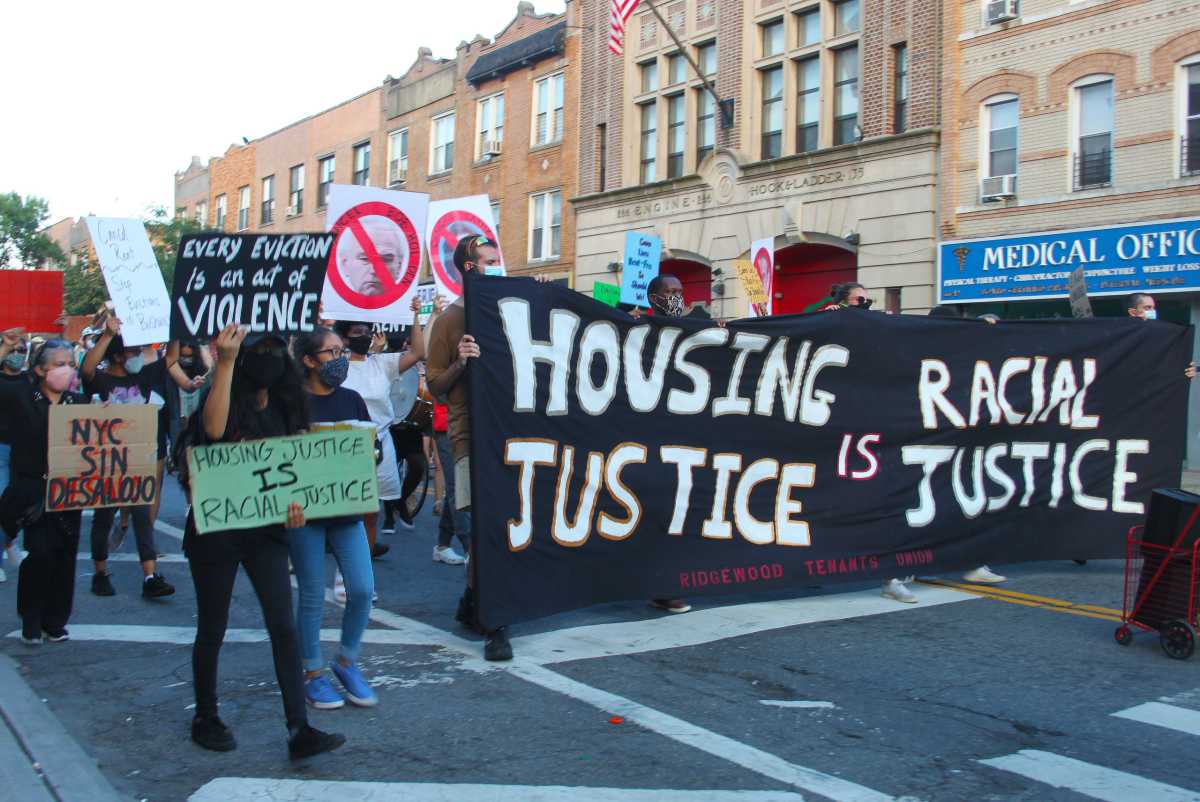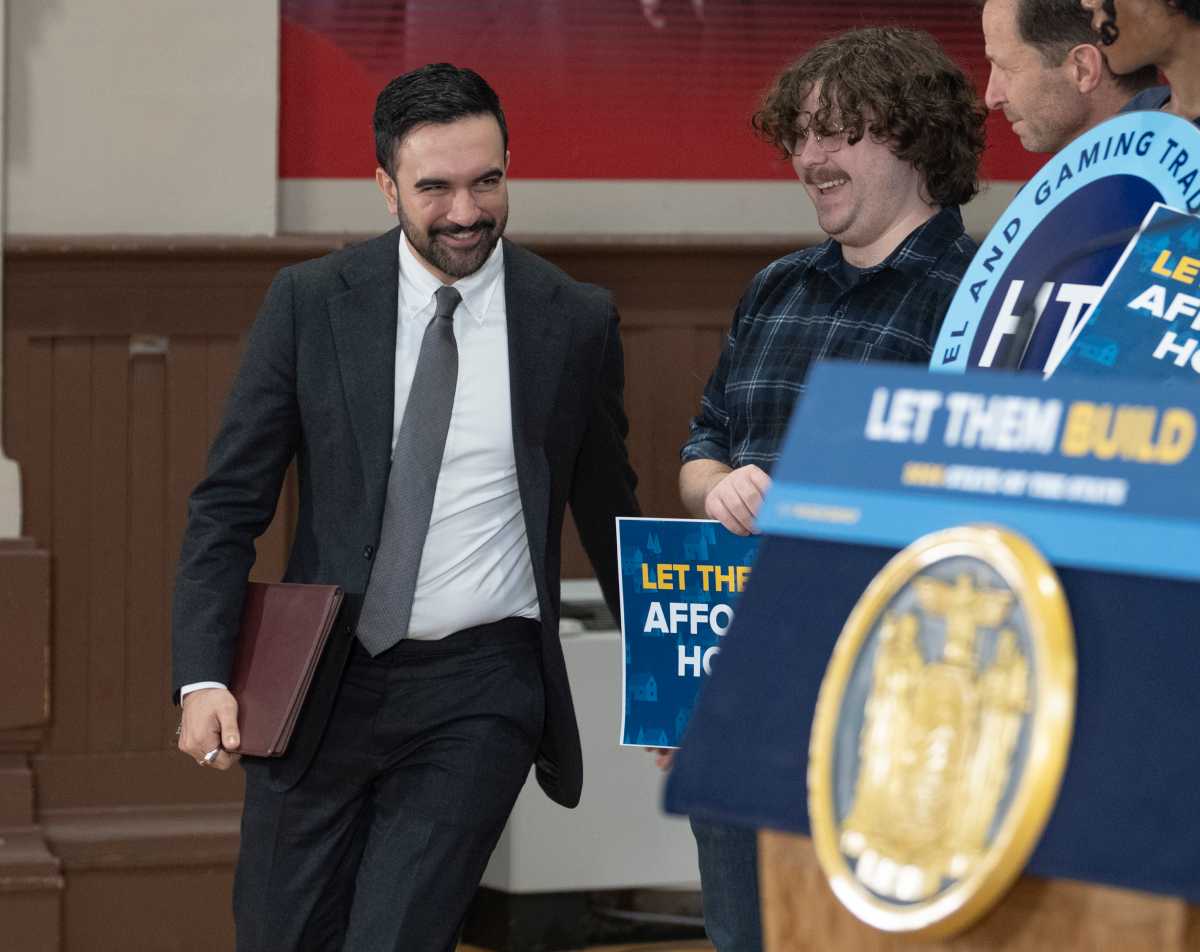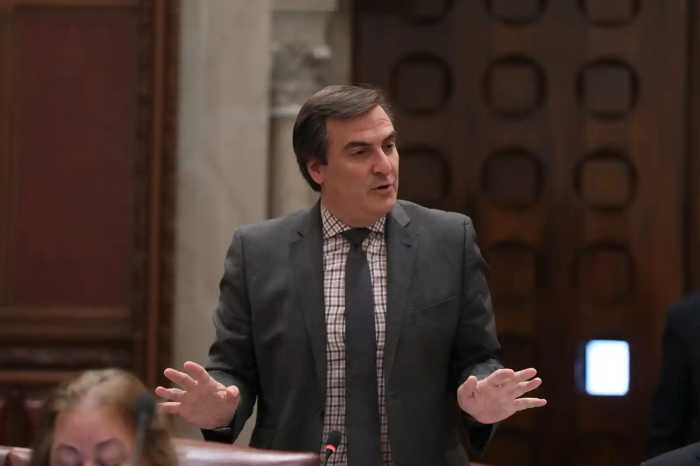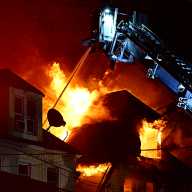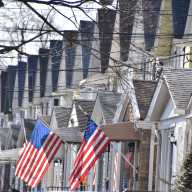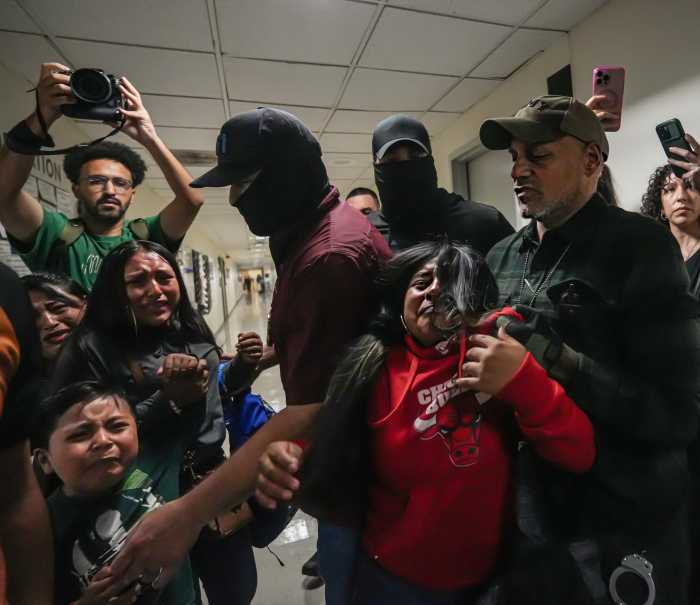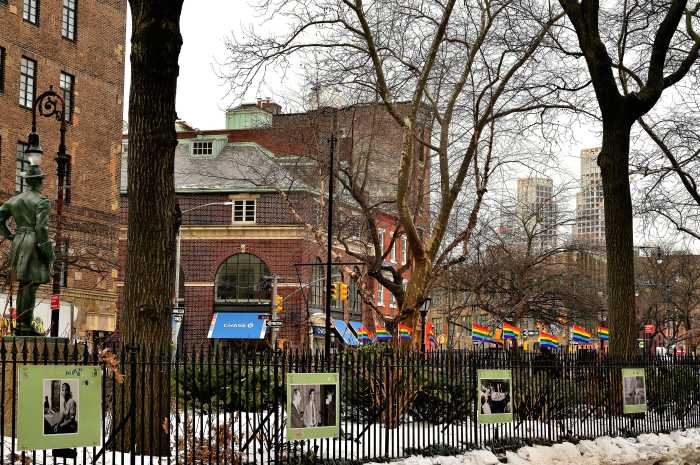Hundreds of people marched from Glendale to Bushwick, and back to Ridgewood where they held a sleep-out to demand an eviction-free New York on Saturday, Aug. 1.
“Today is the day to pay rent, unfortunately, more than 1 million people have lost their income and haven’t been able to pay rent,” said Raquel Namuche, an organizer with the Ridgewood Tenants Union (RTU). “That’s why we’re here demonstrating to tell [Gov. Andrew] Cuomo … [we need] ‘universal rent relief, the actual cancellation of rent.'”
While the city has entered phased opening and hundreds of thousands returned to work, the city has 1.3 million workers out of work with the unemployment rate at about 20 percent as of July — “a figure not seen since the Great Depression,” according to The New York Times.
The demonstration, organized by RTU with support from Mi Casa No Es Su Casa and various other tenants associations representing Queens and Brooklyn, began at the Glendale Veterans Triangle on Myrtle Avenue and Cooper Avenue with some English and Spanish speeches.
Throughout the introduction, protesters were repeatedly heckled by a group of people and passersby watching the event.
An organizer with RTU reminds protesters about why they’re there, and emphasizes not to engage or even look at those trying to agitate them. There’s a crowd of what looks like counter-protesters across the street. pic.twitter.com/OqNP2BEuxj
— Angélica M. Acevedo (@angacevedo15) August 1, 2020
The event was one of many eviction protests held throughout the city during the months of the COVID-19 pandemic lockdown, as advocates fear for the safety of tenants at risk of eviction once Cuomo’s eviction moratorium expires entirely on Aug. 20. NYC Housing Court began accepting new eviction filings on June 20.
Caty Seger, a lifelong resident of Glendale, called out Cuomo as well as Councilman Robert Holden and Assemblywoman Cathy Nolan for not doing enough to protect tenants.
“Bob Holden has spent his time in office being anti-homeless and racist,” Seger said. “He’s spent more time fighting a homeless shelter than he’s actually spent guaranteeing housing for all.”
Seger, a member of RTU, told QNS that in the 11385 ZIP code, tenants are not the majority and very little live in rent-regulated buildings.
“Most of the time they’re in private houses where a family will just rent out the second floor, and there’s usually no lease, no protections. It’s actually, most of the time not legal, so because of that we’re particularly vulnerable to eviction,” she said.
After some speakers, the march began toward Ridgewood on Myrtle Avenue, with a fleet of bicyclists acting as barriers and traffic guards. Several police cars followed them throughout the route from behind.
The chants ranged from, “Get up, get down, there’s a housing crisis in this town” to “I said once I pay my rent, damn all my money is spent.”
Once the march reached the Myrtle-Wyckoff Avenues train station, they turned onto Knickerbocker Avenue toward Starr Street, receiving cheers from bystanders throughout the route. Once they reached Starr Street and Wyckoff Avenue, organizers paused in front of what they said is notorious landlord Deodat Lowtan’s home. Lowtan was number 19 on Public Advocate Jumaane Williams’ list of the city’s “Worst Landlords” last year, with about 583 Housing Preservation and Development violations and 17 Department of Buildings violations.
One person trying to organize tenants of Lowtan’s 39 buildings took to the mic to talk a bit about his buildings.
“I wish we had more of his tenants to tell y’all but … there’s so many stories of the b——- that this guy does,” he said. “He’s a big fat wart in this neighborhood and we’re really trying to hold him accountable because he’s been doing it for a long time.”
By 9:30 p.m., they returned to the Myrtle-Wyckoff Avenues train station plaza, which they turned into the “people’s plaza” for the sleep out.
Several dozen protesters set up camp by the station’s triangle that’s closed off to traffic. Organizers gathered bedding and pizza, set up a projector, and had music playing throughout the night.
The sleep out was meant to demonstrate what could happen if families were to get evicted because of an inability to pay rent due to a lack of income as a result of job loss.
Maria Gil, a resident of Bushwick, thought of this idea when commuting to work in Brooklyn and watching unhoused people make the streets their home.
“This is just a reflection of what may happen if the governor doesn’t do anything to cancel rent,” she said in Spanish.
Gil talked about some friends who were too afraid to join the demonstration, but have been struggling to pay rent since March. She said she’s friends with one family with a disabled child that had a parent temporarily out of work from his restaurant that closed in March. Once they reopened a few months ago, he was not asked to return and don’t qualify for government benefits. Their rent is $2,500 and they have only been able to pay for food with their savings.
“I know many families like that,” Gil said, adding that they wanted to ask Cuomo how he’d feel being in their shoes.
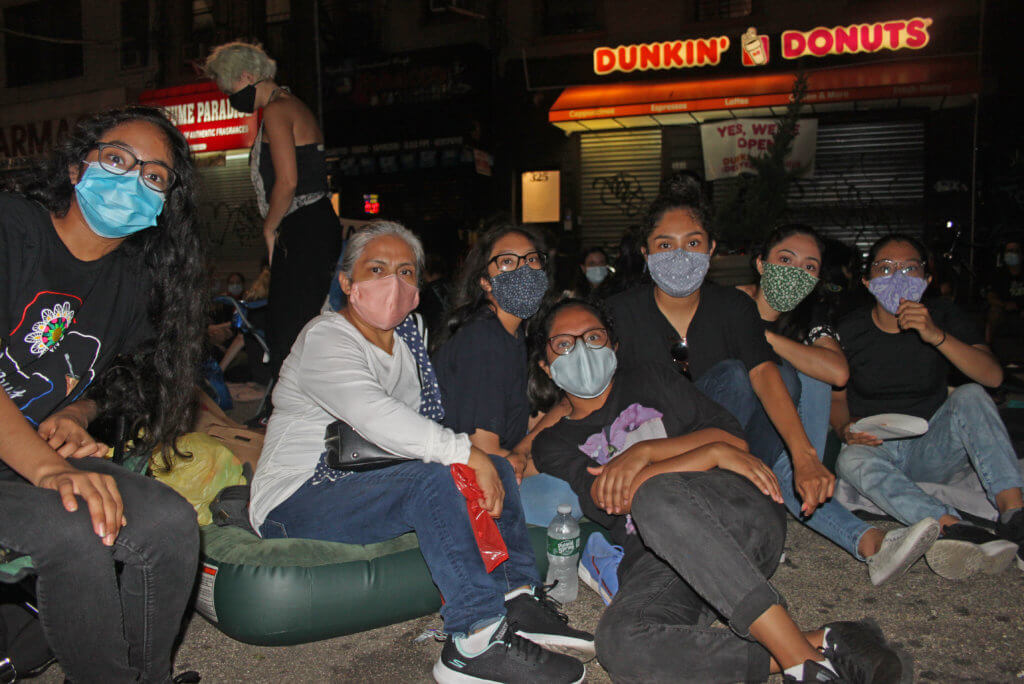
Ana Gil, one of Maria’s daughters who helped organize the event, said they were there marching for those who feel they can’t speak up in fear of retaliation.
“We planned this because a lot of what’s happening right now, it’s affecting everyone, not just the poor,” she said.
Ana said that even before the pandemic, families have experienced landlords trying to price them out or employ other measures to get them to leave. She said their own family experienced this after almost 22 years of living in the same home when their landlord offered them money to leave.
“We used to fight our landlord, and still to this day we do, to fix our building … but ever since people started gentrifying Bushwick or Ridgewood, they’re like, ‘Oh wait, these people could pay more,'” she said.
But Maria added that in their building, there have been vacant apartments for some time now.
“We want to represent those who have been evicted from communities to bring in people who could pay higher prices of luxury buildings that weren’t built for people like my family, low-income families, families with a lot of kids,” Ana said. “It’s been very devastating to see so many people and so many of my neighbors getting high amount of rent for such a tiny space.”

